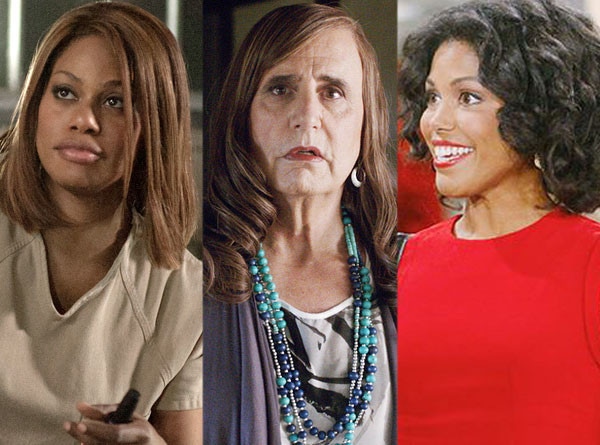 Netflix; Amazon; CBS
Netflix; Amazon; CBSHollywood has made major headway with gay, lesbian and bisexual characters in television and films—with still a long, long way to go—but far less has been done to shed light on transgender portrayals in the media.
GLAAD spokesman Nick Adams sat down with E! News and spoke about the representation of transgender people in the media and how they've been typecast over the past decade as "either psychotic killers or tragic murder victims."
"The most common job shown for transgender characters on television is a sex worker…There have not been good, strong, multidimensional, well-rounded portrayals of transgender people."
But Adams says things are getting better—most notably with Laverne Cox as a transgender woman of color on the Netflix hit Orange Is the New Black, Amazon's Transparent series featuring more than one transgender character and with Karla Mosley's character coming out as transgender on CBS' The Bold and the Beautiful.
"There are over 100 shows that have series regular characters that are lesbian, gay or bisexual. But those are the only three that I know of where they have a series regular character that's transgender," Adams explained.
"We look forward to a time when transgender people are casually included in shows…where being transgender is not the central focus of why this character is on the show, but it is one aspect of their personality that the audience can get to know."
According to Adams, the media can respectfully address transgender people by portraying them "as they want to be portrayed."
That means steering clear of using before pictures, their birth name and referring to them as being "born" a specific sex. It also means that invasive questions about a person's medical history are off limits, specifically regarding whatever surgeries he or she may have undergone during their transition.
Recalling a Katie Couric interview with Cox and Carmen Carrera, Adams explained how the two stars politely declined to discuss their medical history on television after being asked what types of surgeries they had.
"It distracts us from viewing transgender people as whole human beings and from talking about the real social issues, the discrimination and violence. It was a real teaching and learning moment."
Should you find yourself curious about medical transitions, or want to hear directly from transgender people documenting their lives, Adams credits YouTube for being a wonderful resource where people can have many questions answered.
He also offers clear-cut advice for how to communicate with someone who identifies themselves as transgender: "Respect the person and the identity that they're telling you that they have. Realize that those invasive questions about surgeries are personal matters and they're not appropriate in a general conversation."
In the end, Adams reiterates that telling someone you accept them for who they are "is the best thing that you could possibly do."
Learn more about what it means to be transgender at http://glaad.org/transgender
If you are transgender and need help or advice, contact the Trevor Project http://t.co/guMjyYIfng